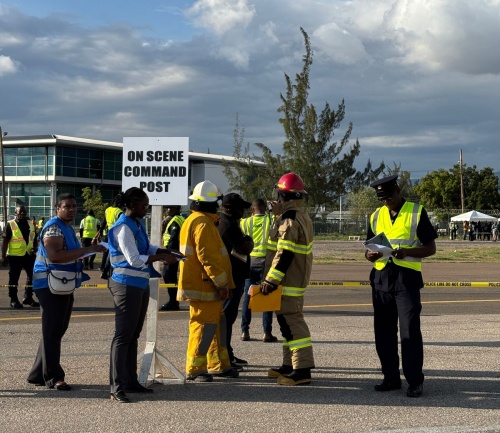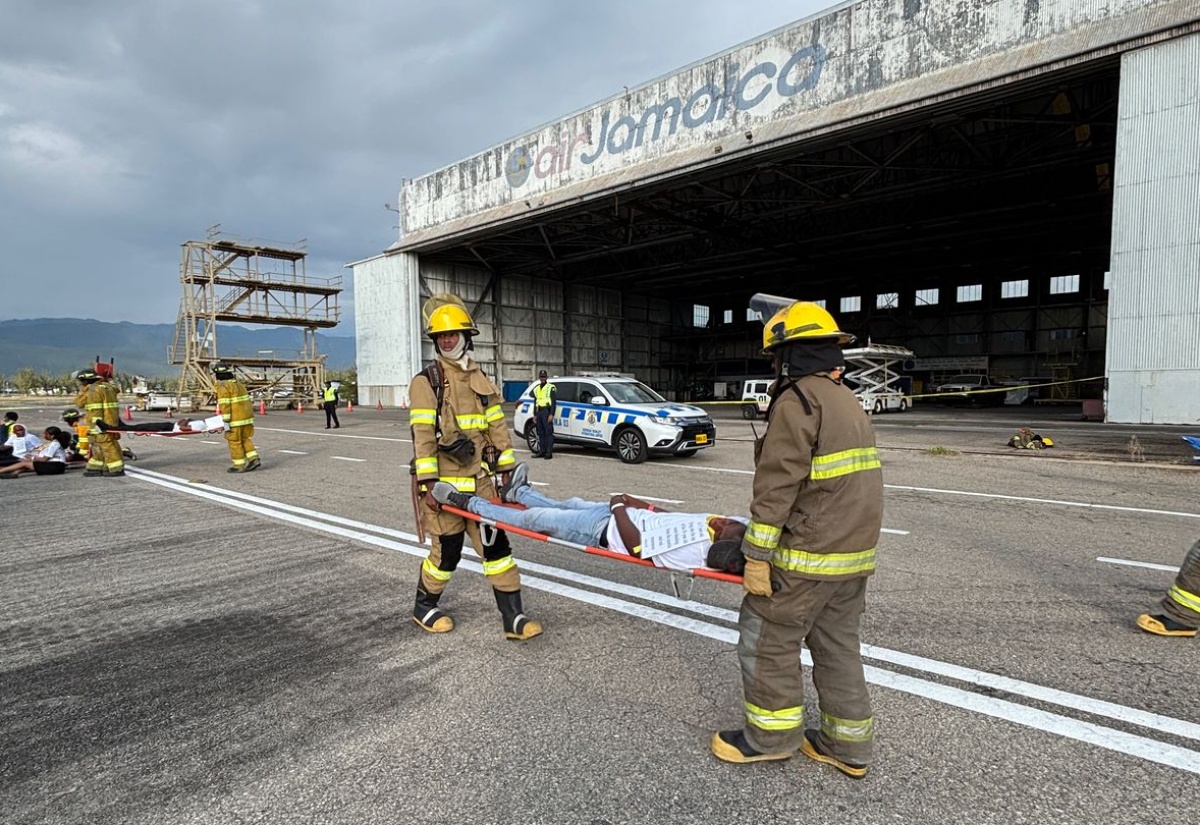AAJ Highlights Importance of Airport Safety and Security Drills
By: , March 28, 2025The Full Story
The Airports Authority of Jamaica (AAJ) is underscoring the importance of airport safety and security drills/training exercises.
President and Chief Executive Officer (CEO) of the AAJ, which regulates Jamaica’s airports, Audley Deidrick, tells JIS News that the International Civil Aviation Organization (ICAO) stipulates that airports maintain rigorous security standards and safeguards for travellers and other users of these facilities.
The ICAO is the world body governing civil aviation.
Mr. Deidrick’s comments come against the background of a recent fire at the Norman Manley International Airport (NMIA) in Kingston, which occurred approximately 24 hours after the execution of a full-scale safety emergency exercise, dubbed ‘Operation Skyfall’, at the facility.
“To further guarantee the maintenance of safety and security standards, the ICAO instituted the certification of airports as a measure to enforce these requirements. Airports are required to demonstrate their operational readiness to respond to safety and security emergencies by conducting a full-scale emergency exercise [simulation] biennially and a table-top exercise in the intervening years,” he adds.
Mr. Deidrick points out that in fulfilment of this requirement, NMIA operators, PAC-Kingston Airport Limited (PACKAL), conducted its emergency exercise simulation on Thursday, March 13.
“On Friday, March 14, 2025, a fire incident took place at NMIA, which immediately called on and, no doubt, benefited from the simulation exercise which was conducted the previous day,” he notes.

The AAJ President adds that, “while these two events were independent and completely coincidental, they unequivocally reinforce the importance of maintaining international civil aviation standards and the requirements of certification”.
For her part, PACKAL’s Director of Operations, Theresa Benjamin, says the simulation exercises are critical and has expressed satisfaction with the response of the emergency teams to the recent fire.
“While the incident that occurred was most unfortunate, the fact that we convened a full-scale emergency exercise the day before, we consider that to have been positive timing. We are very pleased with the response that was provided by our emergency response partners, as well as the PACKAL Emergency Response Team and supporting PACKAL staff, as well as the coordination, the communication and cohesion that we saw on display across all teams,” she tells JIS News.
Ms. Benjamin contends that the simulation exercises “[facilitate] opportunities for teams to practise, get more comfortable with the procedures, get to know the individual stakeholders and build professional relationships.
This, she adds, “so that persons are more comfortable with the persons that they are going to be working with who they, under other circumstances, may not see or interact with”.
The Director says the exercises also provide opportunities for individual stakeholders “to get accustomed to communicating in a high-pressure environment where there is a lot riding on doing things well the first time”. She points out that her team believes that holding the exercise the day before the fire significantly contributed to the positive outcomes observed during the actual emergency.
“That’s why doing these tests, whether full-scale emergency exercises or tabletop exercises, are so critical. This just reiterates PACKAL’s commitment to continuing to do emergency tests, drills and training opportunities so that we can continue to build on this product,” Ms. Benjamin adds.
She says while the team at PACKAL acknowledge that “there is no perfect response, we always want to get it right the first time as much as is humanly practicable”, pointing out that, “doing training exercises is a critical component of that”.
The fire at NMIA was discovered at approximately 7:15 p.m. on March 14 in the Club Kingston VIP Lounge, where it was determined to have started. The resulting smoke spread throughout the terminal by the air-handling unit.
The Jamaica Fire Brigade (JFB) dispatched three units from the Port Royal, Rollington Town and York Park Fire Stations to the airport to extinguish the blaze. This enabled the resumption of normal operations within two and a half hours of the fire’s discovery.
Director of Emergency, Disaster Management and Special Services, Ministry of Health and Wellness, Dr. Nicole Dawkins-Wright, points out that the Ministry also participates in airport simulation exercises by activating its Mass Casualty Incident Plan.
“The Plan details the roles and responsibilities of the relevant players within the emergency response mechanism. Of particular importance is the fact that we would have, over the last four years, conducted twice-yearly training for all responders in accordance with that plan,” the Director states.
Dr. Dawkins-Wright indicates that the simulation exercises are also helpful in testing the Incident Command System (ICS), the Standard Operating Procedures and the alerting process, which are part of the plan.
The ICS is a standardised, on-scene, all-hazards incident-management concept that enables effective and efficient incident management by integrating facilities, equipment, personnel, procedures and communications within a common organisational structure.
Dr. Dawkins-Wright informs that Jamaica, through the Office of Disaster Preparedness and Emergency Management (ODPEM), also has a National Mass Rescue Operations Plan that is tested in other relevant simulation exercises.
According to the ICAO, airport emergency planning is intended to minimise the effects of an emergency, particularly in respect of saving lives and maintaining aircraft operations.
The objectives of the simulation exercises are to test the effectiveness of the airport’s emergency plan; ensure that all agencies involved in emergency response are coordinated and prepared; identify areas for improvement in the emergency response plan, and maintain and improve the airport’s preparedness, responsiveness and business recovery capacity, in the event of emergencies.
The ICAO provides guidance and best practices to support Member States in establishing emergency response and contingency plans.
Participating organisations in the local airport emergency simulation exercises include the Ministry of Health and Wellness, Jamaica Defence Force (JDF), Jamaica Constabulary Force (JCF) and Jamaica Fire Brigade (JFB).




